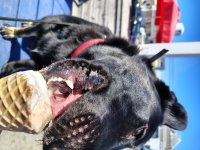- Sep 7, 2025
- 233
- 158
Hi everyone,
Since I’m new to the breed, I’ve been trying to read up on the best ways to start training a GSD puppy. I keep seeing a mix of advice. Some say focus on socialization and obedience right away, others say let them be a puppy first and don’t worry too much until they’re older.
For those of you with experience, what worked best for you in the early months? Did you follow a certain method or trainer, or just stick to basics like sit, down, and leash walking?
I’d love to hear what you think is most important to focus on with a young shepherd so they grow up to be well-behaved and happy.
Thanks in advance!
Since I’m new to the breed, I’ve been trying to read up on the best ways to start training a GSD puppy. I keep seeing a mix of advice. Some say focus on socialization and obedience right away, others say let them be a puppy first and don’t worry too much until they’re older.
For those of you with experience, what worked best for you in the early months? Did you follow a certain method or trainer, or just stick to basics like sit, down, and leash walking?
I’d love to hear what you think is most important to focus on with a young shepherd so they grow up to be well-behaved and happy.
Thanks in advance!

